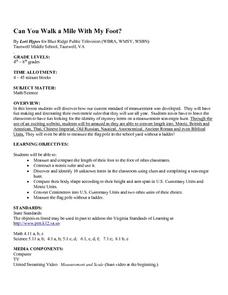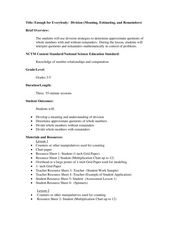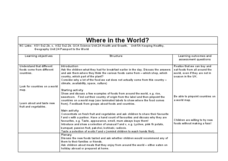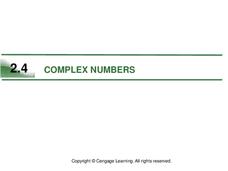Curated OER
Can You Walk a Mile With My Foot?
Students engage in a instructional activity that is concerned with the measurement of a foot as a customary unit. They take part in a series of activities to help them acquire skills of using a foot to compare other units of measurement....
Curated OER
Math: Perimeter, Area, and Volume
Eighth graders discover how to compute the perimeter, area, and volume of different objects. With partners, they find and calculate the perimeter , area, and volume of 10 items each and exchange information. Students compile their...
Curated OER
Adding and Subtracting Money
In this math worksheet, students solve problems involving money. The first problem has four questions that guide the student through the problem solving process. The final four problems are computation problems involving money, but are...
Curated OER
Interior Design
Students experience life as an interior designer. In this math lesson plan, students calculate area and perimeter in inches as they use problem solving skills to design a room.
Curated OER
Addition and Subtraction Facts to 20
Students act out computation problems. In this addition and subtraction lesson, students act out an addition story and write an addition sentence for it. Students continue this activity and answer the provided questions.
Curated OER
Domino Adding
Students practice adding numbers to twelve. In this computation lesson, students construct paper domino patterns and play games in which they use the the dots on the dominoes to make addition problems.
Curated OER
Does Shape Affect Drag?
Young scholars study drag and how it affects a parachute in the sky. In this parachutes lesson plan students build models and compare their drag.
Curated OER
Sherman and Cyrus
In this problem solving worksheet, students compute the number of steps Sherman takes to catch his pet frog, Cyrus. A detailed explanation is included with the answer of the problem.
Curated OER
Enough for Everybody: Division
Young scholars study division. In this math lesson, students arrange manipulatives into equal groups. Young scholars discuss the relationship between multiplication and division.
Curated OER
Algebra—Quadratic Equations and Functions
Students use given information on wind speed with the quadratic formula to determine the pressure of the wind on a building. In this quadratic equations lesson, students compute the pressure of the wind from two data tables. They graph...
Curated OER
Risk Assessment and Geometry
Tenth graders study the concept of risk analysis as it relates to geometry. In this spatial relationship lesson, 10th graders are provided a set of coordinates to analyze a piece of land described. Students write a description that...
Curated OER
Teamwork And Productivity
Pupils engage in a creative project of constructing different things using origami paper. The objective is for them to construct something that is identified and useful at the same time. They use guided questions to go through the...
Curated OER
The Babylonian Algorithm, Limits and Rates of Change
In this successive approximations worksheet, students use the Babylonian algorithm to determine the roots of given numbers. They identify the limits of a function, and compute the rate of change in a linear function. This two-page...
Curated OER
Measurement
Seventh graders measure surface area. In this geometry lesson, 7th graders find the surface area of various geometrical shapes. Using a computer program, students compute the area of 2-D and 3-D shapes. Students use...
Curated OER
The Coldest Place at the Bottom of the World
Young scholars examine Ernest Shackleton's journey through the Antarctic and trace Shackleton's Actual Route on a map using longitude and latitude coordinates. Students compare his intended route with his actual and determine how far...
Curated OER
Measuring Angles
In this math worksheet, students use protractors to measure each of a set of angles. This is a worksheet generator, the teacher controls the minimum and maximum angles students are presented with as well as whether or not to rotate...
Curated OER
Shopping for Candy
Students explore counting money. In this money counting and gingerbread house construction lesson, students use a calculator to determine how much and what type of candy they can buy given 25 cents. Students construct gingerbread...
Curated OER
Where in the World
Students explore the global grid system. In this globe lesson, students identify latitude and longitude lines and how these can tell the coordinates of any place. They use the Internet to find the exact coordinates for their town.
University of Texas
Complex Numbers
Are complex numbers and binomials similar? This stack of slides provides an introduction to complex numbers and shows how to operate with them. The worked examples show a connection between operating with binomials and operating with...
EngageNY
The Most Famous Ratio of All
Pupils develop a definition of a circle based upon its radius in the 17th segment of a 28-part series. They determine the relationship between the radius and the diameter of a circle. To round out the instructional activity, they use the...
EngageNY
An Exercise in Changing Scales 2
Reflect on altering scale factors. The last instructional activity in the series of 22 has the class compare the two scale drawings they created. They realize that the scale drawing becomes a scale drawing of each other. Class members...
CK-12 Foundation
Applications of Probability: What Are the Odds?
Improve your chances of understanding odds. Scholars use an interactive spinner to increase and decrease the number of favorable and unfavorable sections on the spinner. This spinner helps them learn about odds.
Bowland
Hot Under the Collar
It is close enough for all practical purposes. Pupils see two methods to convert degrees Celsius to degrees Fahrenheit, one with exact numbers and another using estimation. Learners review both methods and determine when the estimation...
Curated OER
Geometry In the Yard
Learners are responsible for creating a border around a triangular garden spot, of which they know the measurements for two sides. They use the Pythagorean Theorem to calculate the third side and complete the garden.























